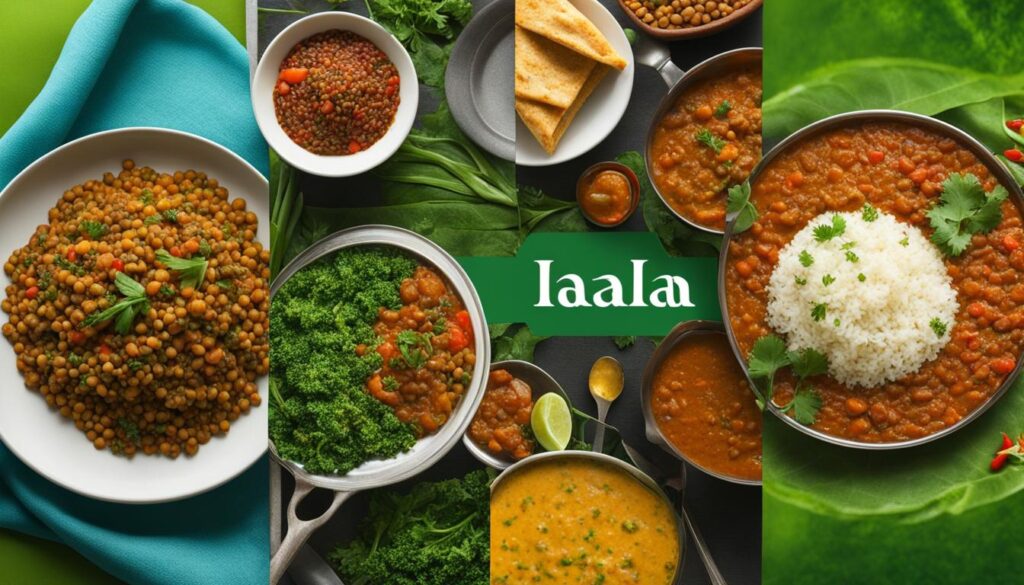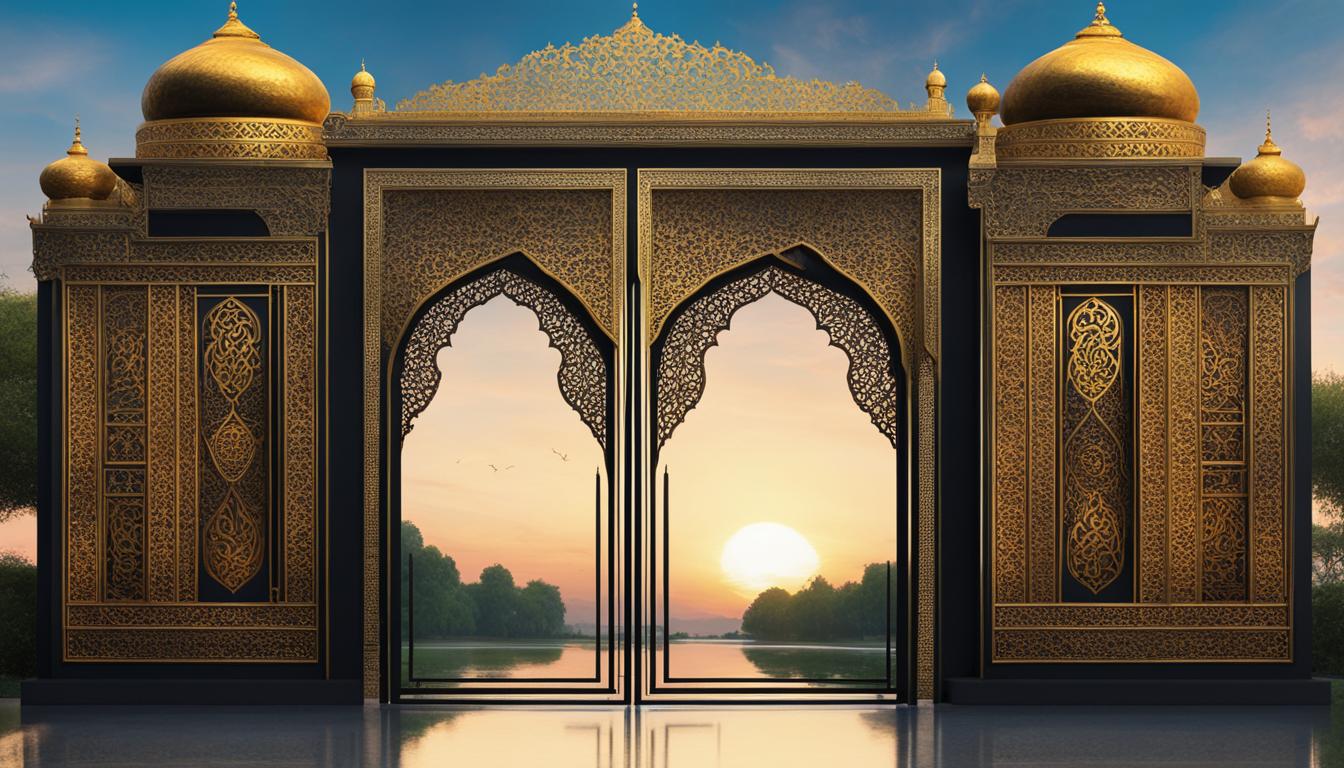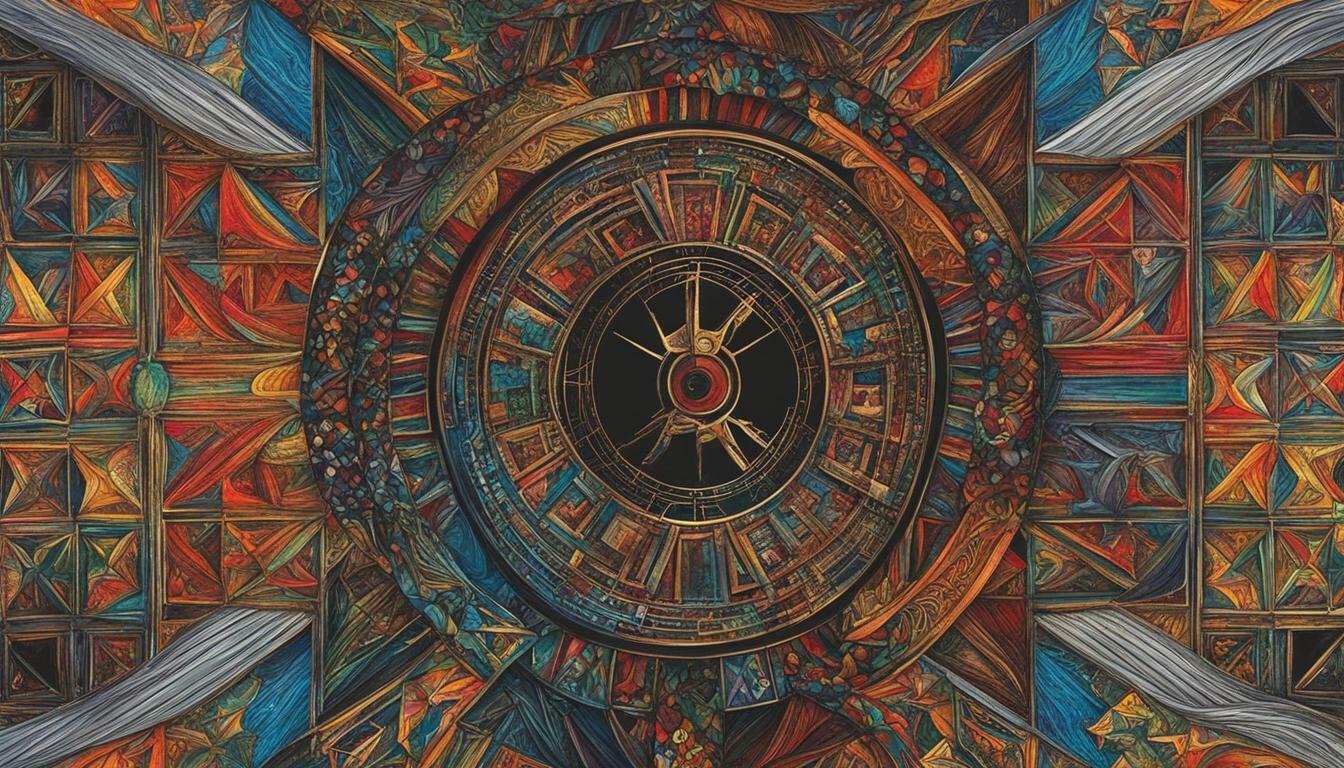Sikhism and Islam are two distinct religions that both have beliefs and teachings about heaven and the afterlife. While there are some similarities in their concepts, there are also significant differences that set them apart. Understanding these differences can help foster respect and appreciation for the diversity of religious beliefs.
Key Takeaways:
- Sikhism and Islam both have beliefs in the existence of heaven and emphasize the importance of leading a righteous life.
- Sikhism focuses on merging with the divine to attain salvation, while Islam teaches that paradise is a reward for the faithful.
- The concepts of heaven in Sikhism and Islam differ in their understanding of the celestial realm and the specifics of the afterlife experience.
- Both religions promote peace, harmony, and a deeper relationship with God among their followers.
- Respecting and understanding the diversity of religious beliefs is essential for fostering interfaith dialogue.
Monotheism in Islam
Monotheism is the central belief in Islam. The Holy Qur’an emphasizes the belief in one God and rejects the worship of many gods. The Qur’an describes Allah as the one and only God who is eternal, absolute, and without a beginning or an end. Islam strictly prohibits associating any beings or objects with God, and the belief in the oneness of God is fundamental to the faith.
Concept of Allah in Islam
Allah, the Arabic word for God, is the supreme being in Islam. Muslims believe that Allah is the creator of the universe, the sustainer of all creation, and the ultimate source of guidance and mercy. The concept of Allah in Islam encompasses attributes such as being all-knowing, all-powerful, and all-merciful. Muslims believe that Allah is transcendent and cannot be fully comprehended by human beings.
| Key Beliefs in Islam | Explanation |
|---|---|
| Tawhid | The belief in the oneness of God. |
| Shirk | The sin of associating partners with Allah. |
| Iman | Faith in Allah, His prophets, and the Day of Judgment. |
| Akhirah | Belief in life after death and the Day of Judgment. |
In Islam, the belief in the oneness of God is not only a theological concept but also influences the daily lives and actions of Muslims. The monotheistic nature of Islam is a fundamental aspect that unites its followers and forms the basis of their faith and worship.
Oneness of God in Islam
The oneness of God, known as Tawhid, is a central concept in Islam. It emphasizes that there is no god except Allah and that He has no partners, associates, or equals. Muslims believe that Allah is the sole deity and that worship and devotion should be directed only to Him. This belief in the oneness of God is considered the foundation of Islamic faith, guiding Muslims in their spiritual journey and actions.
Monotheism in Sikhism
Sikhism, like Islam, upholds the principle of monotheism, emphasizing the belief in a single, supreme God. In Sikhism, God is referred to as “Ekamkar,” meaning “One Creator.” This concept is central to the Sikh faith and is highlighted in the Mool Mantar, the opening verse of the Sikh scripture, Guru Granth Sahib. The Mool Mantar states, “There is only one God, whose name is truth, the creator, fearless, without hate, beyond time, undying, self-existent, realizing through divine grace.” This verse encapsulates the Sikh belief in the oneness and omnipresence of God.
The Sikh concept of God is characterized by qualities such as love, compassion, and justice. Sikh Gurus and scholars have consistently emphasized the oneness of God throughout the Sikh scripture, stressing the importance of recognizing the divine presence in all aspects of life. Sikhism teaches that the path to spiritual enlightenment lies in developing a deep and personal relationship with the divine, through meditation, prayer, and selfless service.
To symbolize the oneness of God, Sikhs use the symbol “Ek Onkar” or “Ik Onkar,” which translates to “One God.” This symbol is prominently displayed in Gurdwaras (Sikh temples) and serves as a reminder of the unity and singularity of God. It signifies the belief that there is only one divine being who pervades everything in the universe.
Key Points:
- Sikhism upholds monotheism, believing in the existence of a single, supreme God.
- The Sikh concept of God is represented by the term “Ekamkar” and is characterized by qualities such as love, compassion, and justice.
- The Mool Mantar, the opening verse of Guru Granth Sahib, highlights the belief in the oneness and omnipresence of God.
- The symbol “Ek Onkar” or “Ik Onkar” is used in Sikhism to signify the unity and singularity of God.
Equality Among Different Human Beings
In both Sikhism and Islam, equality among all human beings is a fundamental belief. Both religions emphasize the importance of treating every individual with respect, regardless of their race, color, religion, or social status. In Sikhism, this belief is deeply rooted in the teachings of Guru Nanak Dev Ji, the founder of the Sikh faith, who preached the message of equality and social justice.
In Islam, the Quran states that all believers are equal in the sight of Allah, and that no one race or ethnicity is superior to another. The Prophet Muhammad emphasized the value of fairness and justice, teaching his followers to treat all people with kindness, compassion, and respect.
The Concept of Equality in Sikhism
In Sikhism, the concept of equality is central to the faith. Sikh Gurus and scholars have consistently advocated for the elimination of discrimination and the promotion of equality in all aspects of life. Sikhism teaches that all individuals, regardless of their gender, caste, or social status, have equal access to God’s love and grace.
The Concept of Equality in Islam
Similarly, Islam teaches that all human beings are equal in the sight of Allah. The Quran states that “the most honorable of you in the sight of Allah is the most righteous” (Quran 49:13), emphasizing that piety and virtue are the true measures of a person’s worth.
| Sikhism | Islam |
|---|---|
| Teaches that all people are equal in the eyes of God | Teaches that all believers are equal in the sight of Allah |
| Promotes love, humility, and equality | Emphasizes fairness, justice, and compassion for all |
| Rejects discrimination based on race, religion, or social status | Discourages discrimination based on race, color, or social status |
Both Sikhism and Islam advocate for the importance of equality among all individuals. They recognize the inherent dignity of every human being and teach their followers to treat others with fairness, respect, and compassion. By embracing these principles, followers of both religions can contribute to creating a more inclusive and harmonious society.
Equality of Women in Sikhism and Islam
Sikhism and Islam both hold the principle of equality among all individuals, regardless of their gender. Both religions emphasize the importance of women’s rights and the equal treatment of men and women in religious and social contexts.
In Sikhism, women are considered equal to men in all aspects of life. They have the same opportunities for spiritual growth, can participate in congregational services, and hold leadership roles within the Sikh community. Sikh women can also visit Sikh temples for worship and engage in religious practices alongside men.
Similarly, Islam recognizes the equal status of women and men before God. Women in Islam have the right to education, inherit property, engage in business, and participate in public life. While there may be variations in the interpretation and implementation of women’s rights within different Muslim communities, the fundamental principle of gender equality is upheld.
| Women in Sikhism | Women in Islam | |
|---|---|---|
| Leadership Roles | Sikh women can hold leadership roles within the Sikh community, such as priests and lecturers. | Women can participate in leadership roles within Islamic organizations and engage in community affairs. |
| Worship and Religious Practices | Sikh women can visit Sikh temples for worship and engage in religious practices alongside men. | Women can actively participate in prayer and engage in acts of devotion, including reading the Quran and engaging in remembrance of Allah. |
| Education and Rights | Girls have equal access to education and the right to inherit property in Sikhism. | Islam recognizes women’s right to education, inheritance, and active participation in public life. |
It is important to note that while Sikhism and Islam emphasize gender equality, it is essential to consider the various interpretations and practices within these religions. Ongoing discussions and debates exist within both communities to ensure the proper understanding and implementation of gender equality in religious and social spheres.
Monogamy in Marriage
When it comes to the institution of marriage, both Sikhism and Islam emphasize the importance of monogamy. However, there are some differences in their views and practices regarding this topic.
In Sikhism, the ideal form of marriage is believed to be a lifelong commitment between one man and one woman. Sikhs are encouraged to establish a relationship based on fidelity and loyalty. The Sikh scriptures, known as Guru Granth Sahib, promote the values of love, trust, and mutual respect within the context of marriage.
In Islam, monogamy is also considered the ideal form of marriage. However, Islamic law, known as Sharia, allows for polygamy under certain circumstances. According to Islamic teachings, a man can have up to four wives, but strict conditions must be met. These conditions include treating all wives equally and responsibly providing for each of them physically, emotionally, and financially.
| Sikhism | Islam |
|---|---|
| Monogamy is the ideal form of marriage. | Monogamy is also considered the ideal form of marriage. |
| Encourages fidelity, loyalty, and a lifelong commitment between one man and one woman. | Polygamy is allowed under certain conditions, such as treating all wives equally and responsibly providing for each of them. |
It is essential to note that monogamy is the preferred and widely practiced form of marriage in both Sikhism and Islam. While polygamy is permitted in Islam, it is not commonly practiced by the majority of Muslim couples. Ultimately, the emphasis in both religions is on establishing a strong and harmonious marital bond based on love, respect, and mutual understanding.
- Monogamy is the preferred form of marriage in both Sikhism and Islam.
- Sikhs are encouraged to establish a relationship based on fidelity and loyalty.
- Islam allows for polygamy under certain conditions, including treating all wives equally and responsibly providing for each of them.
It is important to respect and understand the cultural and religious contexts in which these beliefs and practices exist. Both Sikhism and Islam place strong emphasis on building strong, loving, and committed marriages that prioritize the well-being and happiness of both partners.
Fasting and Pilgrimages
In both Sikhism and Islam, fasting and pilgrimages play important roles in the religious practices and spiritual journeys of their followers. While the specific practices and beliefs may differ between the two religions, both emphasize the significance of these acts as a means of deepening one’s faith and connection with the divine.
Fasting in Sikhism and Islam
In Sikhism, fasting is not considered a religious obligation but rather a personal choice for spiritual discipline. It is not mandated as a requirement for salvation or spiritual growth. Sikhs may choose to fast as a way to focus their minds and bodies on meditation and prayer, but it is not considered an essential practice.
In Islam, fasting holds great significance and is observed during the holy month of Ramadan. Muslims are required to abstain from food, drink, and other physical needs from dawn until sunset. Fasting in Islam is seen as a way to purify the soul, develop self-discipline, and empathize with those who are less fortunate. It is considered one of the Five Pillars of Islam and an act of worship that brings believers closer to Allah.
Pilgrimages in Sikhism and Islam
Sikhism has pilgrimage sites known as Gurdwaras, where Sikhs gather for prayer, meditation, and to pay homage to their Gurus. The most significant pilgrimage site for Sikhs is the Harmandir Sahib, also known as the Golden Temple, located in Amritsar, India. Sikhs from around the world visit the Golden Temple to seek spiritual solace and experience the sacred atmosphere of the place.
In Islam, one of the most important religious obligations is the Hajj pilgrimage to the holy city of Mecca in Saudi Arabia. The Hajj is considered a mandatory duty for Muslims who are physically and financially able to undertake the journey. It is a pilgrimage that symbolizes unity and equality, as Muslims from all walks of life come together to perform the sacred rituals prescribed by the Prophet Muhammad.
| Fasting | Sikhism | Islam |
|---|---|---|
| Religious Obligation | No | Yes |
| Significance | Personal choice for spiritual discipline | Required act of worship and self-discipline |
| Observance | Not mandatory but can be practiced | Mandatory during the month of Ramadan |
| Pilgrimages | Sikhism | Islam |
|---|---|---|
| Significance | Seeking spiritual solace and paying homage to Gurus | Mandatory act of worship and symbol of unity |
| Main Pilgrimage Site | Golden Temple, Amritsar, India | Mecca, Saudi Arabia |
| Requirements | None, open to all Sikhs | Physically and financially able Muslims |
Relationship with God in Sikhism and Islam
Both Sikhism and Islam emphasize the importance of developing a deep and personal relationship with God. In Sikhism, this connection is fostered through the practice of “Nam Japo,” which involves remembering and meditating on God’s name. Sikhs believe that by continuously reciting God’s name and focusing on their divine presence, they can establish a profound spiritual connection with Waheguru, the Sikh name for God.
Similarly, in Islam, believers strive to cultivate a strong bond with Allah through various acts of devotion. Salah, which involves the performance of ritual prayers, is a fundamental practice in Islam and serves as a means of communication between individuals and their Creator. Muslims also engage in the recitation and contemplation of the Quran, seeking guidance and wisdom from the divine words.
Both Sikhism and Islam acknowledge that the relationship with God is a deeply personal and individual experience. While the specific practices and rituals may differ, the ultimate goal is to establish a connection with the divine and seek spiritual fulfillment. Through prayer, meditation, and devotion, followers of both Sikhism and Islam strive to deepen their understanding of God and strengthen their bond with the divine presence.
| Sikhism | Islam |
|---|---|
| Sikhs establish a connection with God through the practice of “Nam Japo” and meditation on God’s name. | Muslims cultivate a relationship with Allah through ritual prayers, recitation of the Quran, and acts of devotion. |
| This connection is built on the belief in the oneness and presence of God in all aspects of life. | Islam emphasizes the transcendence of Allah and the submission of believers to His will. |
| Sikh prayers and meditation focus on developing a personal relationship with Waheguru. | Islamic practices aim to establish a direct connection with Allah and seek His guidance and mercy. |
Sacred Places in Sikhism and Islam
Sikhism and Islam have sacred places that hold great significance for their respective followers. These holy sites serve as places of worship, pilgrimage, and spiritual connection. Both religions emphasize the importance of these sacred spaces in fostering devotion and deepening the relationship with the divine.
In Sikhism, one of the most revered sacred places is the Harmandir Sahib, commonly known as the Golden Temple. Located in Amritsar, India, it is considered the holiest gurdwara (Sikh place of worship) and serves as a symbol of equality and inclusiveness. The Golden Temple is open to people of all faiths, welcoming visitors to experience the peaceful atmosphere and engage in prayer and reflection.
In Islam, there are several significant sacred sites, with the two most prominent being the Kaaba in Mecca and the Prophet’s Mosque in Medina. The Kaaba is the focal point of the Islamic pilgrimage known as Hajj, and Muslims from around the world gather here to circumambulate the holy structure. The Prophet’s Mosque in Medina is also a revered site, as it houses the tomb of the Prophet Muhammad and is a place of worship and spiritual connection for Muslims.
Table: Sacred Places in Sikhism and Islam
| Sikhism | Islam |
|---|---|
| The Golden Temple (Harmandir Sahib) | The Kaaba in Mecca |
| Amritsar, India | Mecca, Saudi Arabia |
| Open to people of all faiths | Restricted to Muslims for pilgrimage |
| Symbol of equality and inclusiveness | Central focus of the Hajj pilgrimage |
| Place of prayer and reflection | Significant historical and religious importance |
These sacred places hold deep cultural, historical, and religious significance for both Sikhism and Islam. They provide a space for individuals to connect with their faith, seek spiritual solace, and engage in communal worship. While the approach to access may differ between the two religions, with the Golden Temple being open to all and the Kaaba reserved for Muslims, both Sikhism and Islam recognize the importance of sacred spaces in nurturing a sense of belonging and fostering a deeper connection with the divine.
Meat Consumption in Sikhism and Islam
In both Sikhism and Islam, the topic of meat consumption carries significant cultural and religious implications. While both religions have their own distinct views and practices regarding dietary choices, there are notable differences in their approach to vegetarianism and meat consumption.
In Sikhism, there are no specific dietary restrictions, and individuals have the freedom to choose whether to be vegetarian or omnivorous. The emphasis in Sikhism is placed on living a life of compassion, kindness, and selflessness, rather than following strict dietary rules. The Guru Granth Sahib, the holy scripture of Sikhism, does not explicitly prohibit or endorse meat consumption.
In contrast, Islam has clear guidelines regarding dietary practices, including meat consumption. Islamic dietary laws, known as halal, outline specific requirements for the preparation and consumption of meat. Muslims are permitted to consume meat that has been slaughtered according to halal standards, ensuring it is permissible and prepared in a manner that meets the religious requirements.
Comparison of Sikhism and Islam’s Views on Vegetarianism and Meat Consumption
| Sikhism | Islam |
|---|---|
| Allows freedom of choice regarding vegetarian or non-vegetarian diet | Permits meat consumption following halal guidelines |
| Emphasizes compassion, kindness, and selflessness in daily life | Requires adherence to specific dietary laws, including halal standards |
| Does not prescribe strict dietary rules | Outlines dietary restrictions and requirements |
It’s important to note that personal choices regarding vegetarianism and meat consumption may vary among individuals within both Sikhism and Islam. While Sikhism does not enforce vegetarianism as a religious requirement, many Sikhs choose to follow a vegetarian diet as an expression of their compassion and respect for all living beings. Similarly, in Islam, some individuals may choose to follow a vegetarian or vegan diet based on personal preferences or interpretation of Islamic teachings.
Ultimately, the views on meat consumption in Sikhism and Islam reflect the diversity of beliefs and practices within each religion. It is up to individuals to make informed choices that align with their own religious, cultural, and personal values.

Conclusion
Sikhism and Islam have distinct beliefs and interpretations about heaven and the afterlife. While both religions acknowledge the existence of paradise and emphasize leading a righteous life, there are differences in their understanding of the heavenly realm.
In Sikhism, the concept of merging with the divine plays a central role in the attainment of salvation. Sikhs seek to achieve unity with Waheguru, the Sikh name for God, through meditation and devotion. The ultimate goal is to transcend worldly existence and merge with the divine essence.
On the other hand, Islam teaches that paradise is a reward for faithful believers who have led a righteous life according to the teachings of the Qur’an and the Prophet Muhammad. Muslims strive to follow the path of righteousness and believe in the promise of eternal bliss and companionship with Allah in paradise.
Despite these differences, both Sikhism and Islam aim to promote peace, harmony, and a deeper relationship with God among their followers. They share a belief in monotheism, equality, and the importance of leading a moral and virtuous life.
FAQ
What are the main differences between Sikhism and Islam beliefs about heaven?
Sikhism emphasizes the concept of merging with the divine to attain salvation, while Islam teaches that paradise is a reward for righteous and faithful believers.
What is the concept of monotheism in Islam?
Monotheism in Islam is the belief in one God, known as Allah, who is eternal, absolute, and without a beginning or an end.
How does Sikhism view monotheism?
Sikhism upholds monotheism as a core belief, with the one absolute being known as Ekamkar and Omkar.
Do Sikhism and Islam promote equality among different human beings?
Yes, both religions advocate for equality among all people, regardless of their color, religion, caste, creed, race, or sex.
How do Sikhism and Islam view the equality of women?
Both Sikhism and Islam recognize the equality of women before God. Sikhism allows women to participate and lead in congregational services, while interpretations and practices vary among different Muslim communities regarding women’s rights.
What are the views of Sikhism and Islam on monogamy in marriage?
Sikhism encourages a lifelong commitment between one man and one woman, promoting monogamy as the ideal form of marriage. Islam also views monogamy as the ideal, but allows polygamy under certain conditions.
How do Sikhism and Islam practice fasting and pilgrimages?
Sikhism does not emphasize fasting as a religious obligation, but it is considered a personal choice for spiritual discipline. Sikhism also has pilgrimage sites like the Golden Temple in Amritsar. In Islam, fasting during Ramadan is one of the Five Pillars, and Muslims participate in the Hajj pilgrimage to Mecca.
How do Sikhism and Islam emphasize the relationship with God?
Sikhism emphasizes remembering and meditating on God’s name to establish a connection with the divine. Islam practices Salah, reading the Quran, and engaging in remembrance of Allah through dhikr to establish and strengthen the bond with God.
Are there sacred places open to all in Sikhism and Islam?
Yes, Sikhism’s holiest shrine, the Golden Temple, is open to people of all faiths. Islam has sacred sites like the Kaaba in Mecca and the Prophet’s Mosque in Medina, which are primarily for Muslims to perform pilgrimage but generally not open to non-Muslims.
What are the views of Sikhism and Islam on the consumption of meat?
Sikhism does not have dietary restrictions, and individuals can choose to be vegetarian or omnivorous. Islam has dietary restrictions outlined by halal and haram foods, allowing Muslims to eat meat prepared according to Islamic dietary laws.
 Skip to main content
Skip to main content


